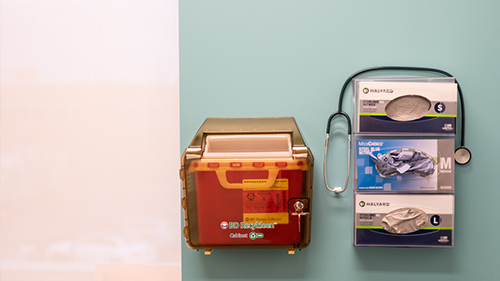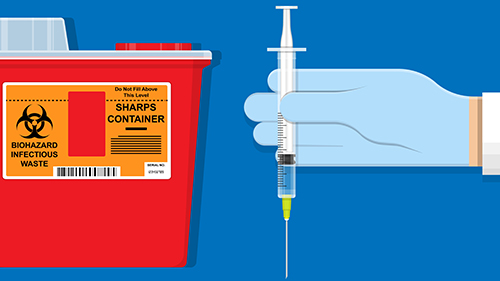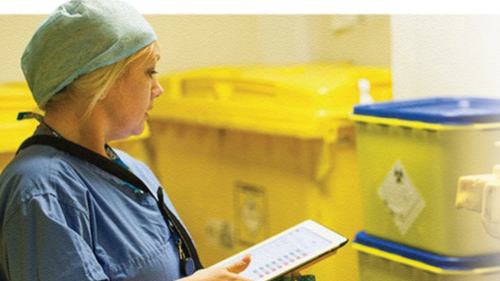A new EPA rule on hazardous waste pharmaceuticals has healthcare executives rethinking their plan to dispose of drugs and hazardous waste. Among other things, these new regulations in the final rule prohibit the disposal of hazardous waste pharmaceuticals down the drain and eliminates the dual regulation of RCRA hazardous waste pharmaceuticals that are also Drug Enforcement Administration (DEA) controlled substances. The new rules also maintains the household hazardous waste exemption for pharmaceuticals collected during […]
Read MoreMedical Waste
Disposal of Sharps: Can You Leave Them in the Bin for Central Accumulation?
If your facility generates waste in the form of needles or other sharps, you may wonder how these sharps should be disposed of in the central accumulation area (CAA). Can they stay in their red biohazard bins with a label? We do not know of any regulations that would prohibit moving red biohazard bins containing sharps to a RCRA hazardous waste central accumulation area (CAA) provided the generator of the sharps is in compliance with […]
Read MoreWhat to Know about New Management Standards for Hazardous Waste Pharmaceuticals
Healthcare entities are facing several changes when it comes to managing pharmaceuticals considered to be hazardous waste under the Resource Conservation and Recovery Act (RCRA). These entities include hospitals, pharmacies, dentists, nursing and long-term care (LTC) facilities, as well as clinics and reverse distributors. The final rule for the Environmental Protection Agency’s (EPA) Management Standards for Hazardous Waste Pharmaceuticals was released in the Federal Register on Feb. 22, 2019, and outlines a new set of […]
Read MoreHospitals, Healthcare, and Long-Term Care Facilities: New Requirements for Hazardous Waste Pharmaceuticals
This post, Hospitals, Healthcare, and Long-Term Care Facilities: New Requirements for Hazardous Waste Pharmaceuticals, first appeared on https://www.lexology.com/. The new hazardous waste pharmaceuticals rule published February 22 by the U.S. Environmental Protection Agency (EPA) applies to all “healthcare facilities.” Hospitals, physicians’ offices, optical and dental providers, long-term care facilities and pharmacies, among others, are subject to the new rule and will have to update their waste management programs and training, as soon as this summer […]
Read MorePatients Who Receive Information About the Importance of Safe Disposal are Three Times More Likely to Dispose of Unused Prescription Opioid Medications
This post, Patients Who Receive Information About the Importance of Safe Disposal are Three Times More Likely to Dispose of Unused Prescription Opioid Medications, first appeared on https://www.businesswire.com. Survey study sponsored by Purdue Pharma and published in the Journal of Pain Research examines factors that contribute to the safe disposal of opioids STAMFORD, Conn.–(BUSINESS WIRE)–Purdue Pharma L.P. today announced the publication of a survey study that found one-third of patients disposed of their unused opioid medication, […]
Read MoreBehind the Curtain of Sharps Injury Prevention and Device Reprocessing
This post, Behind the Curtain of Sharps Injury Prevention and Device Reprocessing, first appeared on https://www.infectioncontroltoday.com/. By Karen A. Daley, PhD, RN, FAAN, and Amber H. Mitchell, DrPH, MPH, CPH Current efforts to reduce sharps injuries (SIs) are most typically associated with those occurring to direct care staff. Less apparent are risks to those working behind the scenes. Ongoing efforts to enhance sharps safety include research, advancements in medical science and safety technology, policy engagement, injury […]
Read More4 tips for managing medical waste at ASCs
This post, 4 tips for managing medical waste at ASCs, first appeared on https://www.beckersasc.com/. Written by Angie Stewart | November 01, 2018 Hospitals and ASCs generate about 2 million tons of general, hazardous, radioactive or infectious medical waste each year, according to All Points Medical Waste. Here are four strategies for disposing of waste properly: Ensure staff members separate and discard all waste materials in accordance with safety regulations. Enlist a certified provider to manage and haul […]
Read MoreProactive ways to prevent improper pharmaceutical disposal
This post, Proactive ways to prevent improper pharmaceutical disposal, first appeared on https://www.mcknights.com/. As the use of pharmaceuticals in long-term care facilities increases, so does the need for proper management of its waste. With the potential to cause harm for facilities, their residents and the environment, it is imperative that LTC owners and operators understand the current regulatory environment and best practices for pharmaceutical waste. A recent Associated Press investigation found that hospitals and LTC […]
Read MoreStop the splashes, spills: How hospitals can ensure safe disposal of infectious fluid waste
This post, Stop the splashes, spills: How hospitals can ensure safe disposal of infectious fluid waste, first appeared on https://www.beckershospitalreview.com. Written by Mackenzie Bean | January 09, 2018 For clinical leaders on the front lines of healthcare, keeping patients and staff safe is the No. 1 priority. “Hospitals must foster safe working environments for clinical staff so they can focus on caring for patients,” said Cindy Witt, RN, senior consultant of clinical operations at Dublin, Ohio-based […]
Read MoreUpdates and Tips for Pharmaceutical Waste Management (Don’t Waste Time!)
This post, Updates and Tips for Pharmaceutical Waste Management (Don’t Waste Time!), first appeared on http://www.pharmacypracticenews.com/. Despina Kotis, PharmD, FASHP Director of Pharmacy Northwestern Medicine Chicago, Illinois Katie Gauen, PharmD Medication Safety and Compliance Pharmacist Northwestern Memorial Hospital Chicago, Illinois Institutions across the country are faced with 2 key challenges related to pharmaceutical waste management: 1) the proper disposal of drugs, particularly if they are deemed hazardous, and 2) the safe and secure disposal of unused […]
Read More








